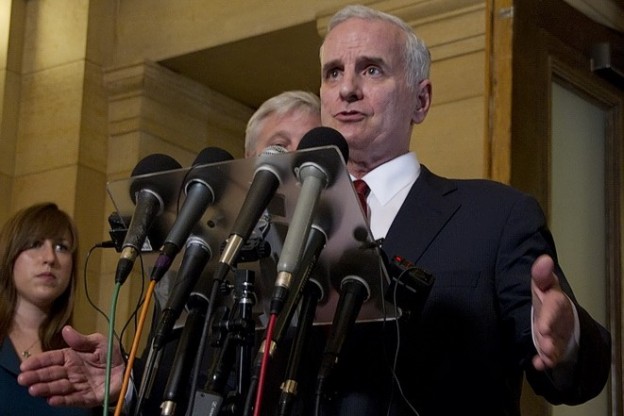
The Minnesota Poll, back in action
The Minnesota Poll, sponsored by the StarTribune and since last cycle conducted by Mason-Dixon, was released over the weekend. It’s been almost a month since we’ve had new public polling data concerning Minnesota, so let’s get right to it.
Mason-Dixon (3/2, no trend lines):
Do you support or oppose applying a lowered sales tax rate to clothing items costing $100 or more?
Support 49
Oppose 42
Undecided 9Do you support or oppose extending a lowered sales tax rate to personal services such as haircuts and auto repair?
Support 45
Oppose 48
Undecided 7Do you support or oppose extending the state sales tax to services businesses purchase, like legal and accounting fees?
Support 28
Oppose 63
Undecided 9Do you support or oppose raising state income taxes on married couples with taxable income over $250,000 and single filers with taxable income over $150,000?
Support 54
Oppose 39
Undecided 7Do you support or oppose raising the state tax on alcohol in place of other proposed tax increases?
Support 61
Oppose 32
Undecided 7
(MoE: ±3.5%)
These numbers are mostly in line with the numbers from the last poll of Minnesota, conducted by SurveyUSA all the way back in February. The one big difference is in support for expanding the sales tax to personal services as opposed to doing the same for business services.
Those differences, in table form:
| Issue | M-D | SUSA |
|---|---|---|
| Clothing | +7 | +3 |
| Services | -3 | -20 |
| Business | -35 | -25 |
| +150k | +15 | +35 |
Some of these differences are quite dramatic. Mason-Dixon finds a wide disparity in support for extending the sales tax to personal services versus support for extending sales taxes to business services, while SurveyUSA found support for those two measures at about the same level.
It seems likely that these differences are due to question wording though, and not a shift in public sentiment. The main difference between Mason-Dixon’s wording on the question of personal services and the question of business services is the inclusion of the word “lowered.”
Here are those two questions in isolation:
Do you support or oppose extending a lowered sales tax rate to personal services such as haircuts and auto repair?
Do you support or oppose extending the state sales tax to services businesses purchase, like legal and accounting fees?
Looking at the way those two questions are worded, and thinking about how a person hearing them over the phone would interpret them, it makes it seem as though the lowered rate would be applied to the personal services, but not the business services. It’s not surprising than that a great deal more people would be against one than the other.
For comparison, this is how SUSA worded those two questions:
There is a proposal to lower the state sales tax rate, but expand the tax to include many consumer services, like haircuts, golf lessons, and auto repairs. Do you support? Or do you oppose? This proposal?
There is also a proposal to require businesses to pay sales tax on many business services, like legal, accounting, and consulting services. Do you support? Or do you oppose? This proposal?
This is yet another example of why polling on issues is a completely different ballgame than polling on horse-races. You have to purposely try to screw up question wording on a horse-race poll. On an issue poll however, there really is no right way to ask a question and as such, there are an infinite number of wrong ways to ask it.
Because of the realities of the polling business model, wanting to convert a maximum number of respondents as efficiently as possible, there is pressure to make questions concise. The more words, the longer it takes to read the question and the longer the interview takes. But too much conciseness can lead to a respondent having a lack of relevant information to be able to properly respond to a question.
The flip side is that too much context, or the wrong context, can taint a respondents answer just as easily as too little context. It’s a delicate balance and easy to get wrong.
What I’m not saying in this post is that one of these polls got the question wording correct and one of them didn’t (although I do prefer SUSA’s wording, I’m sure M-D can make a case for theirs). More to the point, these polls approached question wording in different ways, and unsurprisingly, got some divergent results.
Looking at the composites of the two polls though, it’s pretty clear that a majority of Minnesotan’s favor income tax fairness and narrowly favor an application of a progressive clothing tax. They don’t much care for the rest of the sales tax proposals though.
Thanks for your feedback. If we like what you have to say, it may appear in a future post of reader reactions.


